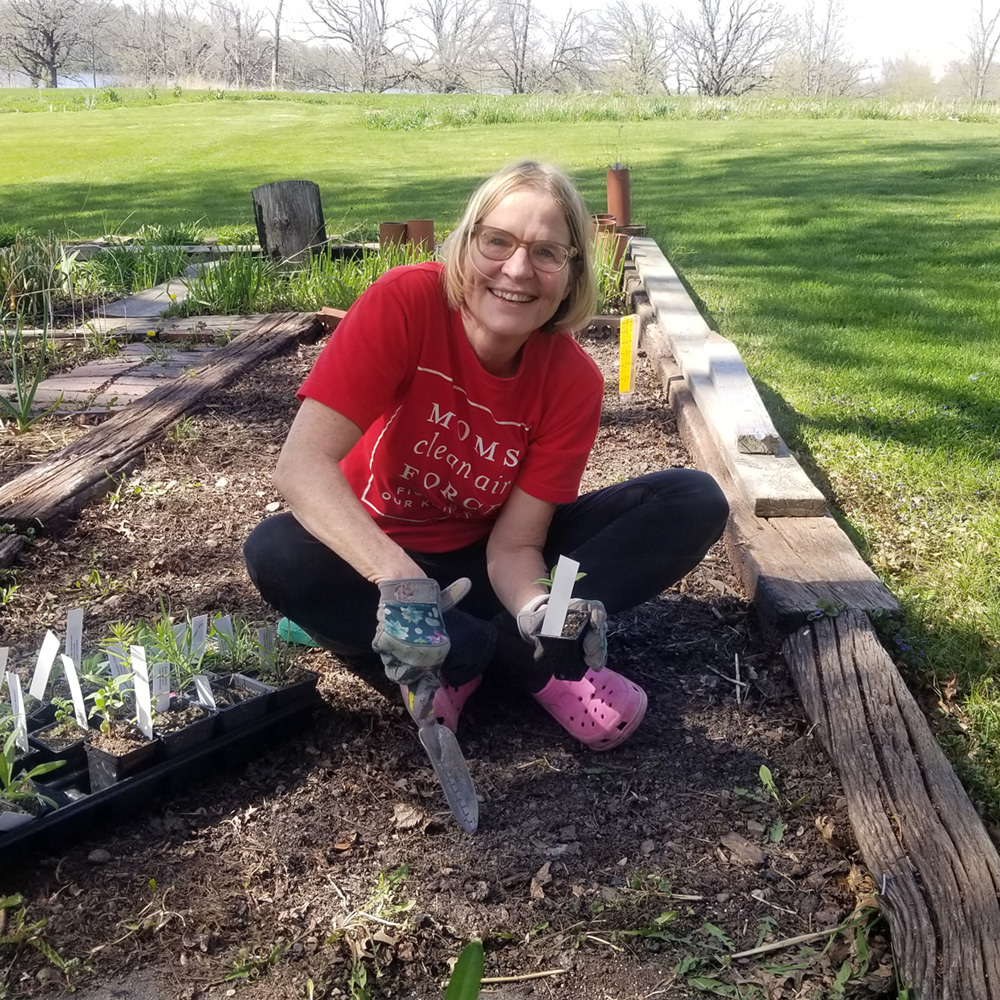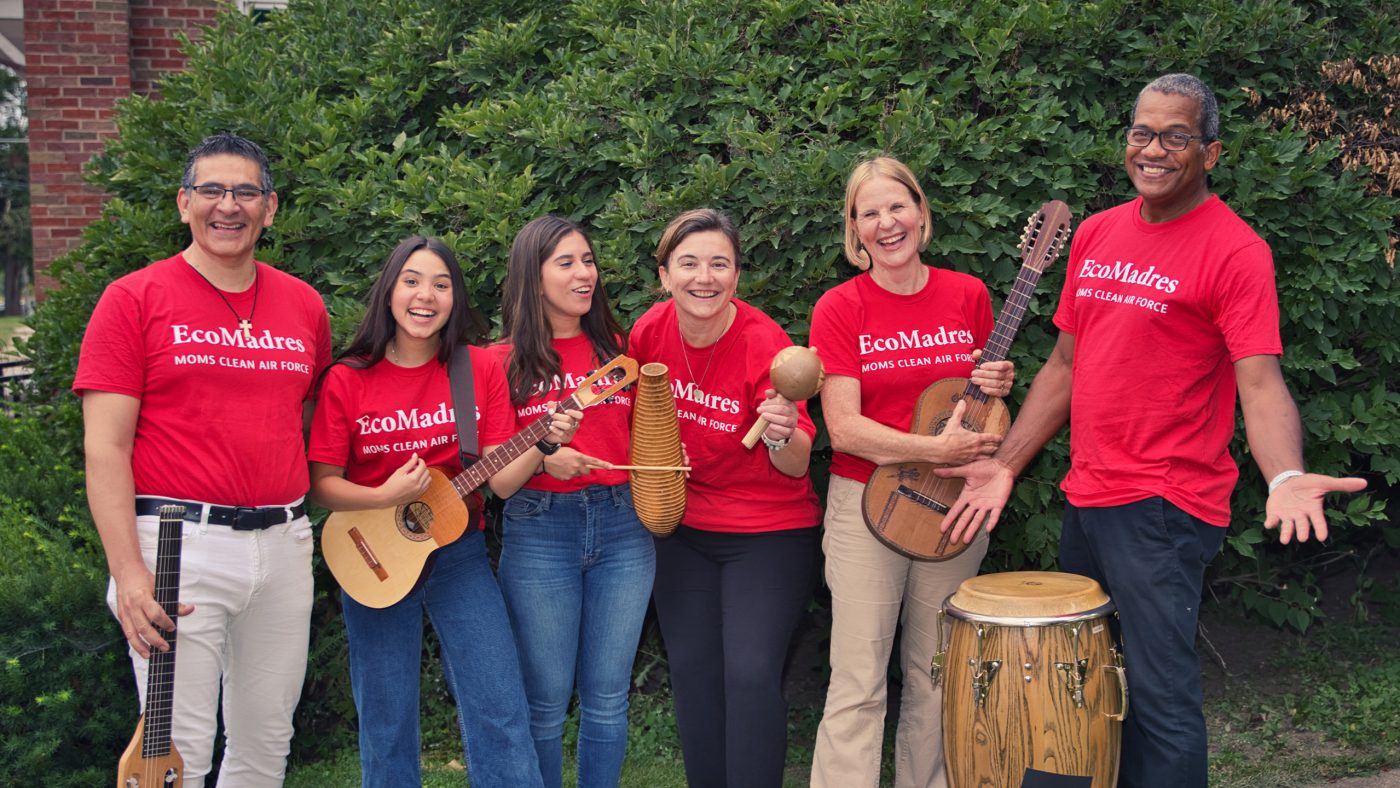With more than 1.5 million members, Moms Clean Air Force unleashes the power of mothers on behalf of Mother Nature. Early Learning Nation magazine recently caught up with Karin Stein, Iowa Field Organizer.
Mark Swartz: There’s so much to say about climate change and children. Moms Clean Air Force is about more than just air quality, right?
Karin Stein: As an organization, we fight for clean air, because air is water and nature writ large; it means fighting for healthy ecosystems and healthy people. We focus on air because it touches all the rest. When people talk about mercury in water, it’s coming from air pollution emitted from coal plants that settles into our creeks and lakes. It then gets deposited in the fatty tissue of fish, which then gets eaten, and if a pregnant person eats the fish, that mercury keeps concentrating further in their fatty tissue. The next thing you know, it’s in the fatty brain tissue of an unborn child at much higher concentrations than when it first left the smokestack of the coal plant. Mercury in children’s brains can lead to serious developmental issues, including impaired motor function, learning impairments and behavioral problems.
👉 New Report Highlights the Connection between Protecting Early Childhood and the Planet
Swartz: What is the relationship between Moms Clean Air Force and EcoMadres?
Stein: EcoMadres is Moms Clean Air Force. It’s a branch that connects culturally and linguistically with a diversity of Latino communities.
Swartz: Have you always lived in Iowa?

Stein: I think of myself as a South American child, a Central American teenager and a North American adult. I was born in Colombia. I grew up in the remote eastern savannas of Colombia with no electricity and lots of wild animals. I had a pet anteater and monkey. As a teenager I lived in Costa Rica and continue to be involved with a rainforest conservation foundation there.
In 1980, I got a scholarship to come to Grinnell College and thought, “Okay, I’ll jump on a plane, get a four-year degree and go back.” But then life happens, and before you know it, 40 years have gone by. I live on the edge of a state park, Rock Creek State Park, and everything else around us is farmland. I have spent most of my life in rural areas around the Americas. This gives me a very strong sense of how various environments have changed as a result of the climate crisis.
👉 Download Moms Clean Air Force’s 2023 Annual Report
Swartz: What did you study?
Stein: I have an undergraduate degree in biology and a master’s degree in horticulture.
Swartz: And you’re also a professional musician. How does that fit into the picture?
Stein: After grad school I was a researcher, but once my first child was born, I turned my musical hobby into my profession. Moms Clean Air Force recognizes that humans are multifaceted and that there are various ways in which we connect. They’ve encouraged me to use music in my community engagement work for Moms, because, as a Latin American, I understand how centrally important music is to our cultural identity. Music is a trust-building language, especially among Latinos. So it’s a tool. It’s not the main tool I use in my work for Moms, but it’s a tool, and we need to use all the tools we can.
Swartz: So, you come to rural Iowa with a different perspective on the natural world from your neighbors, but you’ve probably learned a lot from Iowans about how they view the soil and the planet and the natural world. What kind of conversations do you have?
Stein: Iowa has a really interesting mix of people. My husband and I talk a lot to the family farmers who are still there, but they are an endangered lifestyle, encroached upon by big corporate farming operations. Family farmers tend to be interested in doing what’s right for the soil, the water, even the climate. You don’t hear those concerns expressed by farming corporations.
Swartz: Some people might be surprised that Iowa has air quality issues.
Stein: All it takes is one source of pollution and you have a problem. In northwest Iowa, we have some of the highest asthma and cancer rates in the country. Iowa also has six of the most polluting coal plants in the whole country. I’m involved in a coalition that’s asking MidAmerican Energy, which is owned by Berkshire Hathaway, to close its remaining coal plants by 2030, because their plants are hurting Iowans, especially people of color. Another thing I’d like to mention is that in rural areas, proper air quality monitoring is often overlooked.
Swartz: I’d love to hear about a family that you’ve worked with.
Stein: I’ll tell you about two on diagonally opposite ends of Iowa. There is a woman in southeast Iowa, in the region near Muscatine. She has two boys. One of them, and this is where I start really choking up, the younger one, who is now eight, was born asthmatic. Because of bad air quality in his neighborhood and his school, he’s never played outdoors in the winter. Ever. There are a lot of children who cannot play outside during a good portion of the year because of poor air quality.
And then let’s travel to northwest Iowa, where I just recently met Indigenous leaders. There’s a big Winnebago settlement near one of the two coal plants owned by MidAmerican Energy. And it was simply heart wrenching to hear their testimony about the extremely high cancer and asthma rates in that community. And it boils down to insufficient safeguards on emissions and insisting on continuing to use technologies that we don’t have to use anymore, because we have better options now.
👉 Discover more about Moms Clean Air Force in Iowa
Swartz: It must be gratifying to help them tell their stories to policymakers.
Stein: Some of my proudest moments have been getting very shy immigrants to understand that legislators are not the police, and that the stories of their children are important, because legislators cannot know everything.
Swartz: When you’re talking about small lungs and brains, they’re resilient, but they’re very vulnerable.
Stein: Children are developing organisms with fast metabolisms, breathing faster than adults and inhaling dirty air closer to the ground, at the level of exhaust pipes. We know that particulate matter inhaled by mothers enters the bloodstream, enters the child’s, the fetus’s organism, and can create heart, brain and lung damage before the child is born.
Extreme heat can do that too: it can lead to premature births and many other complications. And those most affected are always the people who can least afford it, the people who least contribute to our climate crisis, who can least afford to protect themselves from the climate crisis.
Anything we can do for our children while they’re developing—in terms of keeping them healthy now and in terms of slowing down the climate crisis—I can’t think of a more important job, frankly, as a mom and as a world citizen.

Mark Swartz
Mark Swartz writes about efforts to improve early care and education as well as developments in the U.S. care economy. He lives in Maryland.



